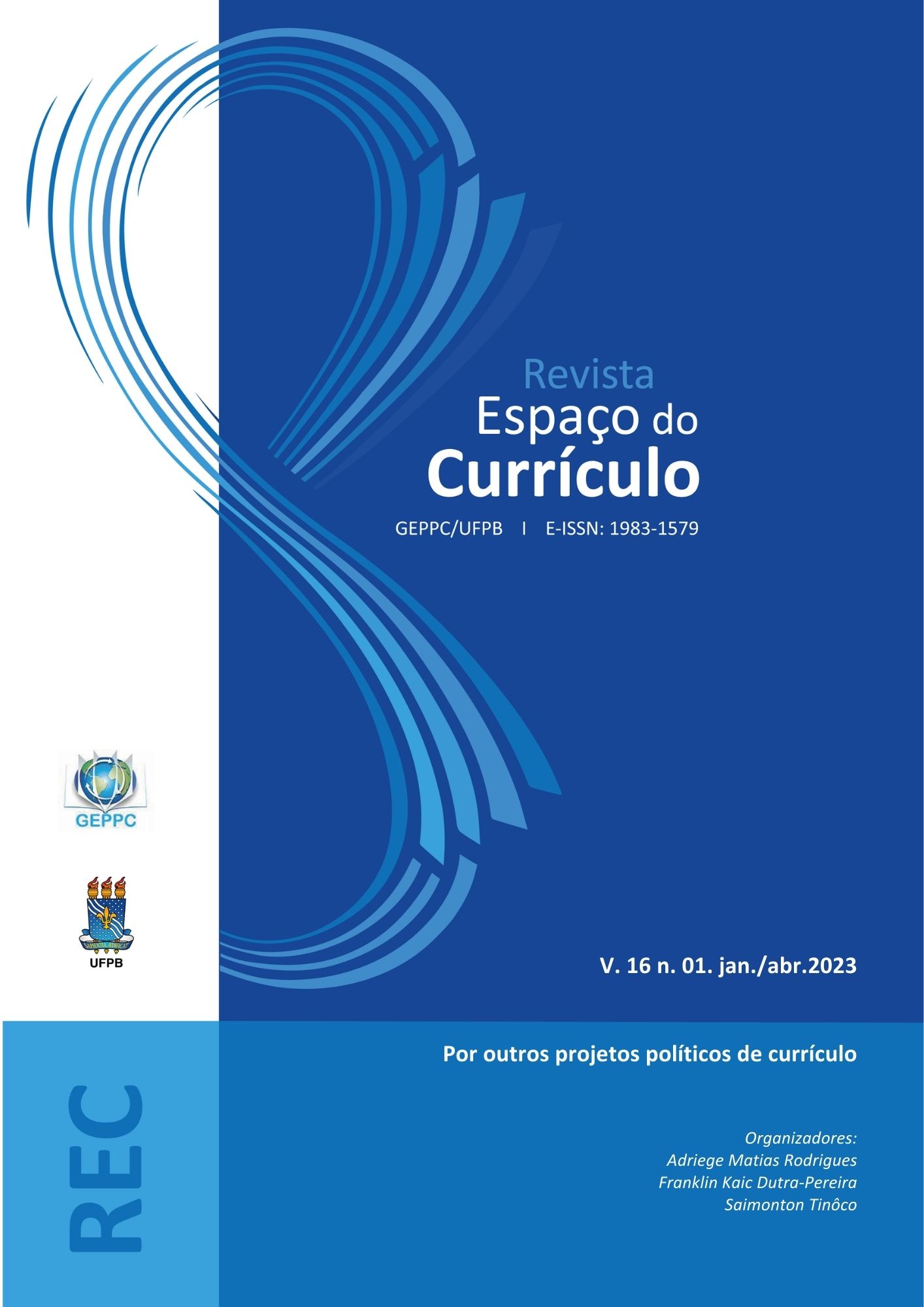ASSUMPTIONS FOR A LIBERATING CURRICULUM
thinking the about the document based on Paulo Freire
DOI:
https://doi.org/10.15687/rec.v16i1.66128Keywords:
Education, Democracy, EmancipationAbstract
Brazil is a country marked by the institutionalization of the curriculum, where this document is given too much importance, one of the ways of controlling the action of educational institutions by the State, as well as the teacher's action, not only being a guideline, but an authoritarian way of demarcating the control of teaching professionalism. In this sense, more democratic alternatives for the formulation of curricula are necessary, and the Freirian theory of Liberating Education presents itself as one of the possibilities. Thus, this article aims to present and describe the assumptions of the curriculum within Liberating Education. To this end, this research is of a qualitative nature, descriptive level, with a deductive bibliographic research approach. In all, 12 assumptions necessary to the formulation of a liberating curriculum were found. Although some criteria have a greater qualitative importance than others, they all compose the same political-educational praxis, and it is not possible to dissociate or neglect them in the process of formulating the document. Thus, radical democracy is the criterion that guides all the others, being epistemically present in the goals, means, justifications, and the whole theoretical-practical set that makes up the liberating praxis. No truly liberating education along the lines of Paulo Freire can be antidemocratic, antidialogical, segregationist, antidialectic, or banking.
Downloads
Metrics
References
BORON, Atílio Alberto. Democracia e Neoliberalismo: história de uma relação infeliz. In: AZEVEDO, José Clovis de. GENTILI, Pablo et al. (Orgs.). Utopia e Democracia na Educação Cidadã. Porto Alegre: Ed. Universidade/UFRGS/Secretaria Municipal de Educação. 2000.
BRASIL. Ministério de Educação e Cultura. LDB - Lei nº 9394/96, de 20 de dezembro de 1996. Estabelece as Diretrizes e Bases da Educação Nacional. Brasília: MEC, 1996.
CIAVATTA, Maria; RAMOS, Marise. A" era das diretrizes": a disputa pelo projeto de educação dos mais pobres. Revista Brasileira de Educação, v. 17, p. 11-37, 2012. Disponível em: https://www.scielo.br/j/rbedu/a/nDS3v6XBFdjG3jQGLRk687m/abstract/?lang=pt. Acesso em 20 dez 2022.
DA SILVA, Alex Costa; INFANTE-MALACHIAS, María Elena. Reflexões sobre a convergência do pensamento de Paulo Freire e de Edgar Morin: contribuições para a formação docente. Cadernos de Educação, n. 42, 2012. Disponível em: https://periodicos.ufpel.edu.br/ojs2/index.php/caduc/article/view/2155. Acesso em 20 jan 2023.
DESCARTES, René. Discurso do método. 2. ed. São Paulo: Martins Fontes, 2001.
FREIRE, Paulo. A Educação na Cidade. 4.ed. São Paulo: Cortez. 2000.
FREIRE, Paulo. A importância do ato de ler. São Paulo: Cortez, 1989.
FREIRE, Paulo. Conscientização: teoria e prática da libertação – uma introdução ao pensamento de Paulo Freire. 4. ed. São Paulo: Moraes, 102 p. 1980.
FREIRE, Paulo. Direitos Humanos e Educação Libertadora: Gestão democrática da Educação Pública na cidade de São Paulo. (Org.) Ana Maria Araújo Freire e Erasto Portes Mendonça. 4ª Ed. Editora Paz e Terra. Rio de Janeiro. 2021c.
FREIRE, Paulo. Educação como prática da liberdade. 51ª Ed. Editora Paz e Terra. Rio de Janeiro. 2021a.
FREIRE, Paulo. Educação e Mudança. 46ª Ed. Editora Paz e Terra. Rio de Janeiro. 2021b.
FREIRE, Paulo. Pedagogia da autonomia. São Paulo: Cortez, 1997.
FREIRE, Paulo. Pedagogia da Tolerância. (Org.) Ana Maria Araújo Freire. 9ª Ed. Editora Paz e Terra. Rio de Janeiro. 2022b.
FREIRE, Paulo. Pedagogia do oprimido. 82ª Ed. Ed. Editora Paz e Terra. Rio de Janeiro. 2022a.
FREIRE, Paulo. Política e Educação. 5ª ed. Coleção Questões da Nossa Época; V.23. São Paulo: Cortez. 2001.
FREIRE, Paulo; FAUNDEZ, Antonio. Por uma pedagogia da pergunta. Rio de Janeiro: Paz e Terra, 1985.
FREIRE, Paulo; SHOR, Ira. Medo e ousadia: o cotidiano do professor. 12. ed. Rio de Janeiro: Paz e Terra, 2008. 224 p.
MENEZES, Marilia Gabriela de; SANTIAGO, Maria Eliete. Contribuição do pensamento de Paulo Freire para o paradigma curricular crítico-emancipatório. Pro-Posições, v. 25, p. 45-62, 2014. Disponível em: https://www.scielo.br/j/pp/a/QJxGZXzMDX4Qjpkxd5jRfFD/abstract/?lang=pt. Acesso em 20 jan 2023.
NASCIMENTO JÚNIOR, Antônio Fernandes. Fragmentos da construção histórica do pensamento neoempirista. Ciência & Educação, Bauru, v. 5, n. 1. 1998. Disponível em: https://doi.org/10.1590/S1516-73131998000100005. Acesso em: 27 set. 2022. Disponível em: http://educa.fcc.org.br/scielo.php?pid=S1516-73131998000100005&script=sci_abstract&tlng=pt. Acesso em 20 dez 2022.
NOVAK, Joseph Donald; GOWIN, Bob. Aprender a aprender. Lisboa: Plátano Edições Técnicas. 1996.
SÃO PAULO (Cidade). Secretaria Municipal de Educação de São Paulo. Documento: Aos que fazem a educação conosco em São Paulo/ Construindo a Educação Pública Popular. Suplemento do Diário Oficial do Município, de 01/02/ 1989.
SÁ-SILVA, Jackson Ronie et al. Pesquisa documental: pistas teóricas e metodológicas. Revista brasileira de história & ciências sociais, v. 1, n. 1, p. 1-15, 2009. Disponível em: https://periodicos.furg.br/rbhcs/article/view/10351. Acesso em 30 nov 2022.
SAUL, Ana Maria. A construção do currículo na teoria e prática de Paulo Freire. In: APPLE, Michael; NÓVOA, António (Org.). Paulo Freire: política e pedagogia. PortoPortugal: Porto Editora, 1998. 192 p.
SAUL, Ana Maria; SILVA, Antonio Fernando Gouvêa. O pensamento de Paulo Freire no campo de forças das políticas de currículo: a democratização da escola. Revista e-curriculum, v. 7, n. 3, 2011. Disponível em: https://revistas.pucsp.br/curriculum/article/view/7597. Acesso em 30 jan 2023.
SCHWAB, Joseph. The practical 3: translation into curriculum. School Review, 81(4): 501-522. 1973. Disponível em: https://www.journals.uchicago.edu/doi/abs/10.1086/443100. Acesso em 20 jan 2023.
TRIVIÑOS, Augusto Nibaldo Silva. Introdução à pesquisa em ciências sociais: a pesquisa qualitativa em educação. São Paulo: Atlas, 1987.
Downloads
Published
How to Cite
Issue
Section
License
Copyright (c) 2023 Curriculum Space Journal

This work is licensed under a Creative Commons Attribution 4.0 International License.
By submitting an article to Curriculum Space Journal (CSJ) and having it approved, the authors agree to assign, without remuneration, the following rights to Curriculum Space Journal: first publication rights and permission for CSJ to redistribute this article. article and its metadata to the indexing and reference services that its editors deem appropriate.
















